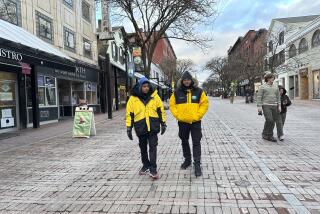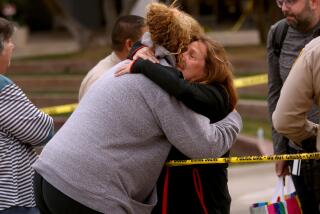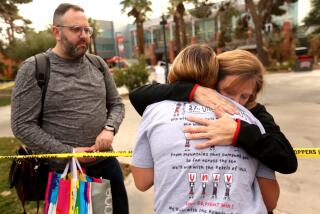Holocaust survivor gave his life to save students
- Share via
If you were lucky enough to have a choice, there were only two ways to go Monday morning on the campus of Virginia Tech: away from danger or toward it. Seventy-six-year-old engineering professor Liviu Librescu chose the second option, saved a classroom full of students and became a hero -- at the cost of his life.
As a child, he had survived the Holocaust. As an adult, he had survived persecution for defying Romania’s brutal Communist regime during the Cold War. With their children grown, he and his wife, Marlena, had spent a quiet two decades on a peaceful university campus in rural Virginia.
But Monday, trouble found him once more. With bursts of gunfire rattling through the second floor of Norris Hall, Librescu closed his classroom door, giving his students time to escape through the windows, recalled senior Caroline Merrey of Baltimore, the third student to jump.
“He saved my life,” Merrey said.
As they fled, Librescu held the door shut with his body while the gunman, 23-year-old Tech senior Seung-hui Cho, tried to force his way inside.
Moments after the last student leapt to safety, Cho apparently forced the door open and shot Librescu to death.
“My father has showed a sense of his courage in standing up for what he believed since long ago,” said Joe Librescu, his son.
Librescu’s actions struck a chord around the world.
“Just one candle can light up a room filled with darkness. Professor Librescu has lit the entire world with hope, reminding us that heroes can still exist even in our dark times,” Evan Goldenthal of Toronto wrote on a Facebook.com page of tributes to Librescu.
What Librescu did was one of the most conspicuous acts of heroism to surface thus far in the bloodiest massacre inflicted on an American campus by a lone gunman. But it was not the only story of bravery and determination in the face of mortal danger.
Students also fought off attempts by the gunman to force open the doors to other classrooms.
In one case, Cho had shot as many as a dozen students in a German-language class, then departed in search of new targets. Two students held the door shut when the gunman returned, and he fired several rounds into the door in frustration.
There were numerous reports of students using articles of clothing and in one case even a piece of wire to fashion tourniquets and stop bleeding from gunshot wounds, as well as taking other first-aid measures for themselves and others.
Derek O’Dell, a 20-year-old sophomore majoring in biological sciences, said the gunman entered his classroom and opened fire without saying a word. O’Dell said most of the approximately 20 students in the class were hit. A bullet struck him in the right arm.
Cho left the room, and O’Dell and another student, who was not identified, slammed the door and held it shut with their feet. Minutes later, Cho returned and tried to push his way back into the classroom.
“He got the door open maybe an inch or two and then we were able to shut it again,” O’Dell told news organizations.
Another student who kept Cho at bay was Zach Petkewicz. “I was completely scared out of my mind originally, and just went into a cowering position,” Petkewicz told CNN in describing his initial response. “And then I just realized, I mean, you’ve got to do something.”
Petkewicz said he and his 10 classmates became aware of the danger when they heard gunshots and a scream. Another student, peeking out, saw the gunman and ducked back inside.
“Everybody kind of went into a frenzy, a panic. I hid behind the podium and then just kind of looked up at the door. It was just like, there was nothing stopping this guy from just coming in,” Petkewicz told CNN.
“And so I said, ‘We need to barricade this door.’ Me and two others got up, threw a couple of tables in front of it, and had to physically hold it there.... He came to our door, tried the handle, couldn’t get in because we were pushing up against it.
“He tried to force his way in, got the door to open up about 6 inches, and then we just lunged at it and closed it back up.
“And that’s when he backed up and shot twice into the middle of the door,” Petkewicz said.
He was one of several students who described hearing the gunman eject empty clips and reload, then renew his attack.
Minutes later, when police reached the second floor of Norris Hall, they found Cho dead, apparently having killed himself.
In the case of Librescu, violent death came with a special irony: It arrived when he seemed to have found tranquillity -- as well as contentment -- after a life of danger and struggle. He had become a popular professor with an international reputation in aeronautical engineering
“He and my mom led a simple life in a pastoral place in Virginia, between hills and mountains, and he loved the school in which he taught,” said son Joe, who had attended Tech as a student.
As a boy, Librescu survived the Holocaust in Romania, where fascists who collaborated with Hitler killed hundreds of thousands of Jews.
After World War II, Librescu became a distinguished scientist but clashed with the communist regime that ruled the country after it came under Soviet dominance. He was harassed for refusing to embrace the communist government and for secretly circulating his scientific papers in the West, family members said. He was forced from his job when he asked to emigrate to Israel.
Only after a personal appeal by Israeli Prime Minister Menachem Begin in 1977 was Librescu allowed to leave. He taught and carried on his research in Israel for almost a decade, then went to Virginia Tech on a sabbatical that turned into a 20-year career as a lecturer and research scientist.
In Israel, Monday was Holocaust Remembrance Day.
*
valerie.reitman@latimes.com
Times staff writers Bob Drogin, Faye Fiore and Johanna Neuman contributed to this report.
More to Read
Sign up for Essential California
The most important California stories and recommendations in your inbox every morning.
You may occasionally receive promotional content from the Los Angeles Times.













